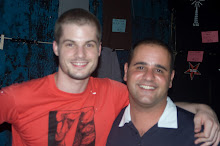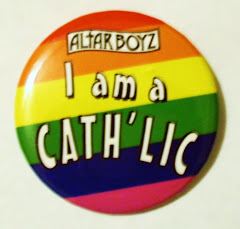
“I just want to be known as the Australian diver who did really well at the Olympics. It’s everybody else who thinks it’s special when homosexuality and elite sport go together.”
-- Matthew Mitcham, interview with The Advocate, August 26, 2008
I’ve been MIA from the blog for a while now, mostly because I’ve been immersing myself in the grand global spectacle that is the Olympic Games. And as the 17-day competition draws to a close, I find myself exalted, exhausted, and brimming with pride. Pride in my country, and now, more than ever, in my sexuality. I bring you Matthew Mitcham.
In the months leading up to the games, Mitcham came out publicly during an interview with The Sydney Morning Herald. In the course of the conversation, the reporter asked with whom Mitcham was living. Without hesitation, he responded that he lived with his partner of two years, Lachlan. In an instant, he became a rarity in mainstream sports – an out gay athlete.
If the statistic that 1 in 10 men are gay is to be trusted, there should be dozens, if not hundreds, of gay athletes competing in Beijing. From what I’ve been able to gather, Mitcham is the only out athlete at these Games. When you think about it, it shouldn’t be that surprising. Mitcham isn’t the first athlete to be open about his sexuality, although most come out after they have retired from active competition. And he does enjoy competing in a sport with a documented history of gay participants.
Sports can often be homoerotic. Hugging and ass slapping are all-too-common sights on various fields of play as forms of encouragement and celebration. Then you get images of baseball players adjusting their cups or the star quarterback with his hands between the legs of his offensive lineman hiking the ball at the beginning of each play. Even the apparel is homoerotic – leotards in gymnastics, unitards in wrestling, speedos in swimming and diving, bike shorts in cycling, and tights in figure skating.
Yet, the hyper-masculinity that’s synonymous with sports creates a homophobic environment in the locker room. Numerous professional athletes have expressed an unwillingness to accept a gay teammate. It’s no wonder why gay athletes choose to remain in the closet when being open about their sexuality exposes them to the risk of ridicule and rejection. I can only imagine how torn they must be, having to sacrifice their identity in order to pursue athletic endeavors. This, like so many other aspects of life, is unfair.
But Matthew MItcham has adopted a mindset that I admire and strive to take on myself. His pursuit of sport and his sexuality are mutually exclusive parts of his life with no bearing on the other. Being gay neither helps nor hinders him on the platform as he prepares to dive. And you don’t have to be straight in order to pursue the dream of winning an Olympic gold medal.
Today, Mitcham competed in the finals of the men’s 10 meter platform. He stood in 9th place after the first dive, rising to 2nd going into his final dive. Poised at the edge of the platform, he composed himself to perform a Back 2 ½ Somersault with 2 ½ twists – the most difficult dive being attempted in the competition. He took his time, launched himself off the platform, completed the elements of the dive with precision, and entered the water vertically with zero splash. Three of the seven judges awarded him perfect 10’s, and he earned 112.10 points. That dive, which now stands as the highest scoring dive in Olympic history, vaulted him into the lead, earning him the gold medal and realizing his life-long dream.

I’m proud of him and all that he represents for the gay community. But I am most proud of his desire to be seen as an Olympic champion, regardless of his sexuality. Congratulations, Matthew! I, for one, applaud you.



2 comments:
I, for 2, applaud him! And you, because you are such a beautiful writer! YOU ROCK! LOVE YOU! :)
I feel as though the prejudice that gay athletes face, is similiar to the days in which African American athletes were not allowed to compete, and even when they were finally allowed to compete, faced much of the same discrimination. It is sad to think that we have yet to come to a point in our society where we move past blatant discrimination toward any people. I hope that this period of our history will soon be a part of our past.
It is people like Mitcham that are breaking through barriers that are the gateway to acceptance.
Post a Comment